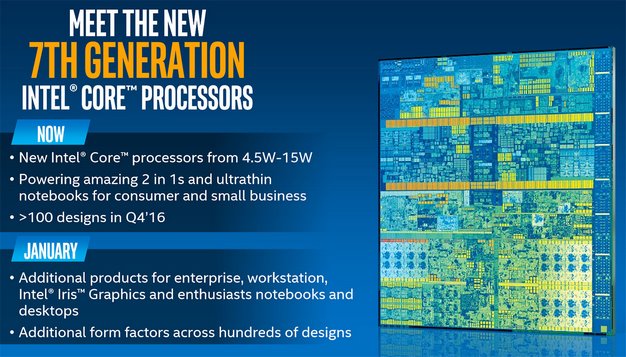Intel Kaby Lake 7th Gen Core Series: Higher Perf-Per-Watt, Enhanced Media Engine
Kaby Lake Closing Thoughts
Although there are other mobile and desktop Kaby Lake-based processors coming down the pipeline that we’ll be able to discuss at a later date, there are a trio of U- and trio of Y-Series low-power parts we can detail here.
As we’ve mentioned, the initial batch of 7th Gen Core Series processors will feature 4.5W – 15W TDPs and they'll target 2-in-1 devices, ultra-thin notebooks, ultrabooks, and adjacent small-form-factor devices. According to Intel, OEM/ODM interest is very high in these parts and they already have more than 100 design wins in the works, due to be released before the end of the year.
Later, in the early part of 2017, a wider array of Kaby Lake-based processors are planned, including some models with Iris Graphics and unlocked K-SKUs that target everything from enthusiast notebooks and desktops to enterprise-class systems.
The feature breakdown for the 15W U-Series parts is noted above here. The three processors in the initial line-up are all dual-cores, with support for quad threads thanks to Intel's Hyper-Threading technology. The Core i3 does not support Turbo Boost, AMT or TSX-NI, and it is also clocked somewhat lower, but it is otherwise similar to it higher-performing counterparts. Surprisingly, the Core i5-7200U is the same price as the Core i3-7100U (in 1KU quantities), so assuming that pricing plays out in the market, expect that Core i5 to be much more widely used. The Core i7-7500U sports a max boost frequency of 3.5GHz, which is more than 10% higher than the previous-gen.
The upcoming Y-Series 7th Generation Core processors are similarly priced as well, and the entry level Core m3-7Y30 is also priced right in-line with its more powerful Core i5-branded counterpart, but these processors are clocked much lower than the U-Series and will be used in thinner, lighter, smaller-form factor devices designed with the 4.5W TDP in mind.
As we’ve mentioned, the initial batch of 7th Gen Core Series processors will feature 4.5W – 15W TDPs and they'll target 2-in-1 devices, ultra-thin notebooks, ultrabooks, and adjacent small-form-factor devices. According to Intel, OEM/ODM interest is very high in these parts and they already have more than 100 design wins in the works, due to be released before the end of the year.
Later, in the early part of 2017, a wider array of Kaby Lake-based processors are planned, including some models with Iris Graphics and unlocked K-SKUs that target everything from enthusiast notebooks and desktops to enterprise-class systems.
The feature breakdown for the 15W U-Series parts is noted above here. The three processors in the initial line-up are all dual-cores, with support for quad threads thanks to Intel's Hyper-Threading technology. The Core i3 does not support Turbo Boost, AMT or TSX-NI, and it is also clocked somewhat lower, but it is otherwise similar to it higher-performing counterparts. Surprisingly, the Core i5-7200U is the same price as the Core i3-7100U (in 1KU quantities), so assuming that pricing plays out in the market, expect that Core i5 to be much more widely used. The Core i7-7500U sports a max boost frequency of 3.5GHz, which is more than 10% higher than the previous-gen.
The upcoming Y-Series 7th Generation Core processors are similarly priced as well, and the entry level Core m3-7Y30 is also priced right in-line with its more powerful Core i5-branded counterpart, but these processors are clocked much lower than the U-Series and will be used in thinner, lighter, smaller-form factor devices designed with the 4.5W TDP in mind.
Intel is also clearly branding these new processors with Core i3 / i5 / i7 markings and a 7th Gen designation.
Although they heavily leverage technology introduced in Skylake, and are based on a similar, albeit enhanced 14nm manufacturing process, upcoming Kaby Lake-based 7th Generation Intel Core processors should offer a better overall user experience than their predecessors. The processors will have increased absolute performance, better multimedia capabilities, and improved responsiveness and power efficiency. The end result should be faster systems, with increased battery life, in more streamlined chassis.
We're expecting to get our hands on Kaby Lake-based notebooks in the coming weeks, at which point we will have a complete performance profile to share. For now, rest assured that an onslaught of completely new or updated notebook and ultrabook designs are on the way, which should be available in time for the holiday shopping season.











